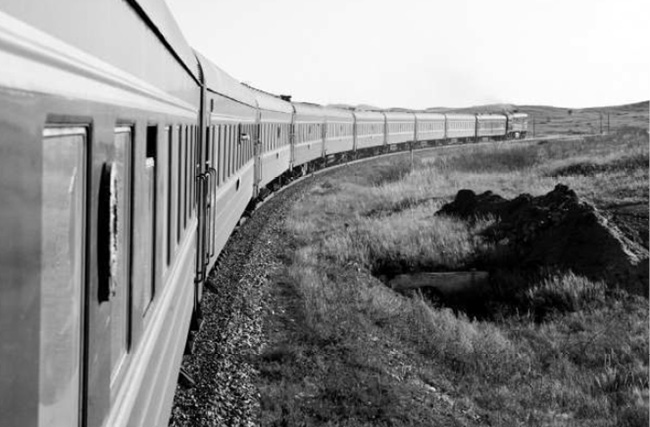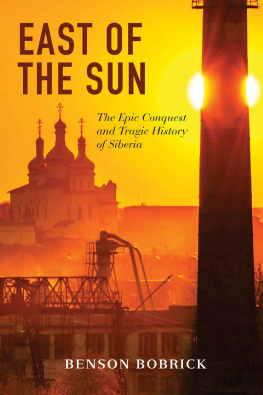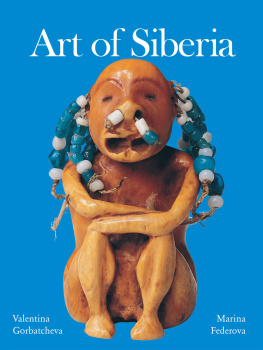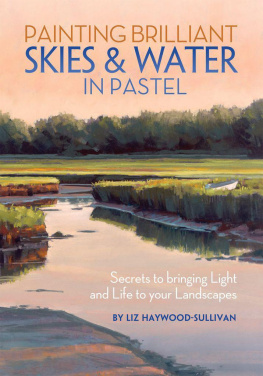Haywood - Siberia: a cultural history
Here you can read online Haywood - Siberia: a cultural history full text of the book (entire story) in english for free. Download pdf and epub, get meaning, cover and reviews about this ebook. City: Oxford;Siberia (Russia);Russia (Federation);Siberia, year: 2010;2012, publisher: Andrews UK;Signal, genre: Religion. Description of the work, (preface) as well as reviews are available. Best literature library LitArk.com created for fans of good reading and offers a wide selection of genres:
Romance novel
Science fiction
Adventure
Detective
Science
History
Home and family
Prose
Art
Politics
Computer
Non-fiction
Religion
Business
Children
Humor
Choose a favorite category and find really read worthwhile books. Enjoy immersion in the world of imagination, feel the emotions of the characters or learn something new for yourself, make an fascinating discovery.

Siberia: a cultural history: summary, description and annotation
We offer to read an annotation, description, summary or preface (depends on what the author of the book "Siberia: a cultural history" wrote himself). If you haven't found the necessary information about the book — write in the comments, we will try to find it.
Siberia: a cultural history — read online for free the complete book (whole text) full work
Below is the text of the book, divided by pages. System saving the place of the last page read, allows you to conveniently read the book "Siberia: a cultural history" online for free, without having to search again every time where you left off. Put a bookmark, and you can go to the page where you finished reading at any time.
Font size:
Interval:
Bookmark:
Title Page
SIBERIA
A Cultural History
By
A. J. Haywood
Publisher Information
First published in 2010 by
Signal Books Limited
36 Minster Road Oxford OX4 1LY
www.signalbooks.co.uk
Digital edition converted and
Distributed in 2012 by
Andrews UK Limited 2012
www.andrewsuk.com
A. J. Haywood, 2010
The right of A. J. Haywood to be identified as the author of this work has been asserted by him in accordance with the Copyright, Design and Patents Act, 1988.
The author and publishers have tried to ensure that information is current and accurate, but no warranty is made for the completeness or the accuracy of its content, and the author and publishers disclaim all liability arising from use.
All rights reserved. The whole of this work, including all text and illustrations, is protected by copyright. No parts of this work may be loaded, stored, manipulated, reproduced or transmitted in any form or by any means, electronic or mechanical, including photocopying and recording, or by any information, storage and retrieval system without prior written permission from the publisher, on behalf of the copyright owner.
Cover Design: Devdan Sen
Typesetting: Devdan Sen
Cover Images: main image: Boris Pamikov (dreamstime.com), back flap: Andrey Semenov (dreamstime.com), front flap: dreamstime.com
Illustrations: A. J. Haywood: 259; altair.co.uk: 104; dreamstime.com: xi, xix, 120, 125, 154, 161, 168, 184, 189, 202, 221; erpmusic.com: 192; istockphoto.com: i, 101, 243; Nigel Young/Foster & Partners: 97; shutterstock.com: 1, 13, 39, 53, 61, 112, 194, 235, 256, 262; wikipedia commons: 17, 22, 31, 43, 70, 75, 81, 85, 98, 110, 116, 129, 141, 145, 153, 176, 227, 277, 279; World History Archive/Alamy: 266
Preface & Acknowledgements
Before setting foot in Siberia, like most people, I imagined it mostly as a distant but somehow exotic place of extreme cold, and a region of vast forests and steppe filled with exiles. It seemed like Australia - my place of birth - in an ice-box. When I happened to come across someone who had travelled through Soviet-era Siberia with a guitar and collected Russian folk songs, my fascination grew. Several years would pass, however, before I crossed the Urals myself. In January 1992, at a time when the Soviet Union had ceased to exist but Russia was caught in colliding worlds of the past and present, I travelled to Moscow and stayed with a family to round off a Russian language course I was doing at Melbourne University. The Moscow I found in early 1992 was a chaos of systems - some things worked by the old rules, others by the new, and the whole economy had moved out of the shops and onto Moscows bustling streets. Visits to St. Petersburg followed, and in 1998 I finally had the opportunity to travel to Siberia for a couple of months spent working on chapters of a guidebook for an international publisher.
The Siberia I found in 1998 was, as in Moscow six years earlier, a twilight zone between the old and the new way of doing things. Each visit to a region is different in its own way, however, and this was also true for the Siberia I visited most recently to research this book. I was surprised to find that some streets in cities had become unrecognizable because of traffic and advertising hoardings. By and large, the hotels had been partially or fully renovated. Extreme poverty had, if not disappeared, become less of a problem. (The villages nevertheless remain Siberias problem zone.) Restoration of buildings had moved ahead, even if much still needed to be done. A mood of neglect had given way to an upbeat optimism and functioning everyday life. Although the financial crisis of 2008-9 halted some projects, this trend will undoubtedly continue. Beyond the towns, the beauty of Siberias physical landscape remained a stabilizing constant. Crossing large parts of this landscape in trains, communal taxis, buses and in boats to research this book was as enjoyable as the distances were exhausting.
Despite enormous progress, the task of restoring Siberia is as monumentally large as Siberia itself. Its historic churches, for example, condemned to neglect for so much of the Soviet period, are in poor shape and their beauty is often found within decaying baroque forms rather than in restored detail. Another of the large tasks facing Siberia, moreover, is the lack of a cultural context in books or in digital sources with which to interpret and understand these cultural landmarks. This book is hopefully a step towards overcoming the deficit - for the armchair reader with a fascination for foreign places, for the traveller on an organized tour - who can use it as a complement to the tour and engage in a dialogue with Siberia- and finally for the independent traveller who can use it as a resource for breaking out on his or her own.
***
I am indebted to many people for their help while researching and writing this book. In particular, I would like to thank Svetlana Cherkashina from Grand-Tour in Tyumen ( www.gt-russia.com ) for organizing a tour of the town at such short notice. Many thanks in Krasnoyarsk to Maria Khramova of Planeta-Tour (incoming@planeta-tours.ru; www.planeta-tours.ru ), who provided invaluable assistance by arranging accommodation in Krasnoyarsk and in Irkutsk. Both provided highly professional support.
Special thanks to Dr. Holger Finken from the German Academic Exchange Service (DAAD), who helped in pre-planning. In Novosibirk, Anja Hess, Tatjana Molodzowa and colleagues from the Informationszentrum (IC) Novosibirsk des Deutschen Akademischen Austauschdienstes offered invaluable support and insight into the region. In Irkutsk, many thanks to staff at the Baikal Hostel (www.baikalhostels.ru) for practical assistance and language support. Hanks also to Lina Tagirova in Listvyanka/Irkutsk, and to staff at the Gostinitsa Mayak (Listvyanka) and the Gostinitsa Angara (Irkutsk) for advice, assistance and good conversation. Thanks also to Nick Brody in Yekaterinburg, Neil and Joanna in Irkutsk, Elena Pikorovskaya in Frankfurt am Main, and in Gttingen Gert Schrder and Ina Schrder. Thanks especially to my wife Sylvia Mhle for support and encouragement. The opinions expressed in this book nevertheless reflect personal interpretations and views, and any errors of fact are my own.
Introduction
Heaven And Hell

It would be odd to talk about the meaning of Siberia for the world. It is known to every schoolchild. Strangers looking at the map only ask: "Are the dimensions correct?"
Nikolay Rerikh (1874-1947)
For todays traveller, a journey to Siberia begins amid bustling scenes of departure on the crowded platform of Moscows Yaroslavl Station or adjacent Kazan Station. Passengers mill at the head of the platform, waiting in expectation with luggage strewn at their feet. The electronic information boards announce train numbers and their distant destinations: Khabarovsk, Ulan-Ude, Vladivostok, Novokuznetsk - far-flung and exotic-sounding corners of Russia. The kiosks do a busy trade in last- minute supplies such as biscuits, nuts, bars of chocolate, pastries, water and the ubiquitous Chinese instant noodles. Brakes wheeze and emit exhausted sighs. In the distance railway workers tap wheel hubs on the carriages, making a puk-puk sound with long-handled hammers while listening for loose parts. One by one, the travellers collect their belongings and move off towards their waiting trains. You join them, struggling with your luggage. You fumble inside your pocket for your passport and ticket to show the conductor stationed at the carriage door and strictly controlling access. You board. Then, punctually, the doors close and the carriage fittings begin to creak. You feel the motion of the train and the platform gradually recedes, giving way to ranging yards and the Moscow suburbs. Perhaps a Russian fellow passenger will add finality to departure by announcing poekhali (were off).
Next pageFont size:
Interval:
Bookmark:
Similar books «Siberia: a cultural history»
Look at similar books to Siberia: a cultural history. We have selected literature similar in name and meaning in the hope of providing readers with more options to find new, interesting, not yet read works.
Discussion, reviews of the book Siberia: a cultural history and just readers' own opinions. Leave your comments, write what you think about the work, its meaning or the main characters. Specify what exactly you liked and what you didn't like, and why you think so.

![Haywood - Viking: The Norse Warrior’s [Unofficial] Manual](/uploads/posts/book/98981/thumbs/haywood-viking-the-norse-warrior-s.jpg)











